The Next Dimension in Healthcare Education
 |
As part of the Northwestern Medicine® goal to “provide innovative healthcare education,” Northwestern University Feinberg School of Medicine began a broad renewal of its MD degree program following a retreat in September 2009 that identified the goals and outcomes of the new curriculum. Since then, nearly 200 faculty, administrators, and staff, along with more than 100 students, have been working to create the new learning modules, design assessments, and participate in pilot projects. This complex undertaking, which includes planning and developing all of the curricular elements affecting current and future students, is being directed by Curriculum Renewal Steering Committee Chair Patricia Garcia, MD, MPH, associate professor in obstetrics and gynecology.
The new curriculum will provide integrated, inquiry-driven, competency-based learning that provides earlier and more substantive clinical experiences, as well as flexibility for students to pursue a mentored, longitudinal area of scholarly concentration. Outstanding patient care will be integrated with basic and clinical sciences. The first of the three-phase model will launch in August.
In this piece, we share the importance of this Northwestern Medicine goal.
Why are we redesigning the curriculum?
“What stimulates this wholesale change is a transformation in the way we think about medical education,” says Raymond Curry, MD, vice dean for education at Feinberg and one of the Northwestern Medicine goal owners. “It’s no longer just about an individual learning to be a doctor; it’s about educating people in what’s increasingly become a team-based, systems-based enterprise.
“When we last revamped our curriculum in 1993, there were no electronic medical records, no human genome project, no competency-based assessments. Not to mention that today’s students are comfortable learning in ways we couldn’t have imagined nearly 20 years ago. We wanted to address these and many other changes in the new model.”
Can you share an example of the work underway?
One element of the new curriculum is a pilot of the Education-Centered Medical Home (ECMH), which is based on the Patient-Centered Medical Home model gaining traction in healthcare.
“The ECMH focuses on opportunities to provide longitudinal continuity with a group of patients, peers, and faculty,” explains John X. Thomas, Jr., PhD, senior associate dean for medical education at Feinberg. “In this medical ‘home,’ a team of 16 students is assigned to a primary care practice and a preceptor to help manage a group of patients on a continuing basis. Students would maintain these assignments for the duration of medical school, seeing the progression of disease and management over time.”
One of 40 students participating in the ECMH pilot, Bruce Henschen, M4, has seen firsthand the value of this approach.
“The chance to take ownership of patients early in medical school, to be able to follow them for four years, and to learn in an engaging environment from your patients and peers, is an experience that can't be obtained in the traditional classroom or clerkship model,” Henschen explains. “The ECMH is revolutionary; I wish that I could have had this experience for four years."
Why is this goal important in the context of Northwestern Medicine?
For the broader community, publicity about the new curriculum will enhance the visibility and reputation of the school and of Northwestern Medicine. With prospective student interviews, a great deal of excitement is already being generated around the new curriculum, which will positively impact the recruitment of medical students.
Another benefit is that doctors, nurses, and residents will be asked to help evaluate students and will become an integral part of the learning process, better aligning education with clinical care. “This is the first time we’ve reached out for direct input from these groups, saying ‘We value what you think,’ ” says Thomas.
In turn, a process of ongoing competency assessments will better ensure skills development for medical students in Northwestern Medicine settings.
“The medical school is already a pathway for future faculty at Northwestern – 15 percent of Northwestern Memorial Hospital medical staff graduated from Feinberg, and 42 percent earned their MD here or completed residency or fellowship training at McGaw,” explains Curry. “With increased attention on learners’ educational needs, this pipeline will ensure a sustained level of excellence that translates into better, more consistent patient care in a collaborative, team-based environment focused on quality and safety.
Outside the medical center, local communities will experience Northwestern’s influence in even more palpable ways.
“With the Education-Centered Medical Homes and a few other new elements, there will be a heightened focus on community engagement,” says Garcia. “Northwestern will have a stronger presence and connection with local neighborhoods, with students learning real medicine in real settings.”
What will success look like?
"The curriculum change will allow us to attract the best students and educate them in an environment that is focused on outstanding patient care, which is safe and effective as well as being in line with sound adult-learning principles,” explains Nicholas Volpe, MD, chair of the Department of Ophthalmology and a goal owner. “Support from physicians, nurses, and staff participating with students in Education-Centered Medical Homes, as well as specialty-specific education, will be critical.”
Adds Curry, “We expect that our students will be more comfortable with the clinical component of their education because they will be exposed to real patients in their first months of study. In addition, they will work better in teams with doctors, nurses, and physician assistants and will continue to do well on assessments and boards.”
“In the end, this paradigm shift in education will bring us the best possible students and help us train them to be the best possible doctors, while enhancing the quality of patient care at Northwestern,” concludes Volpe. “Isn’t that what it’s all about?”
For more information, please visit the curriculum renewal website.